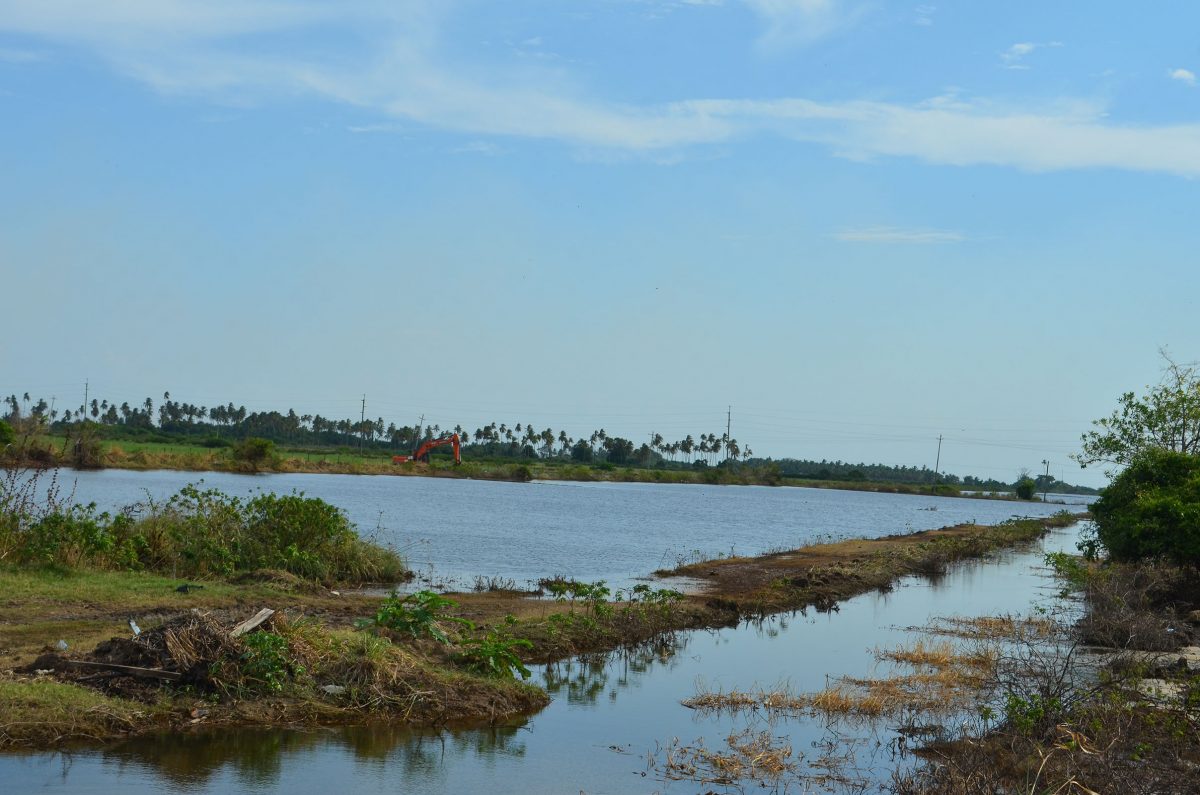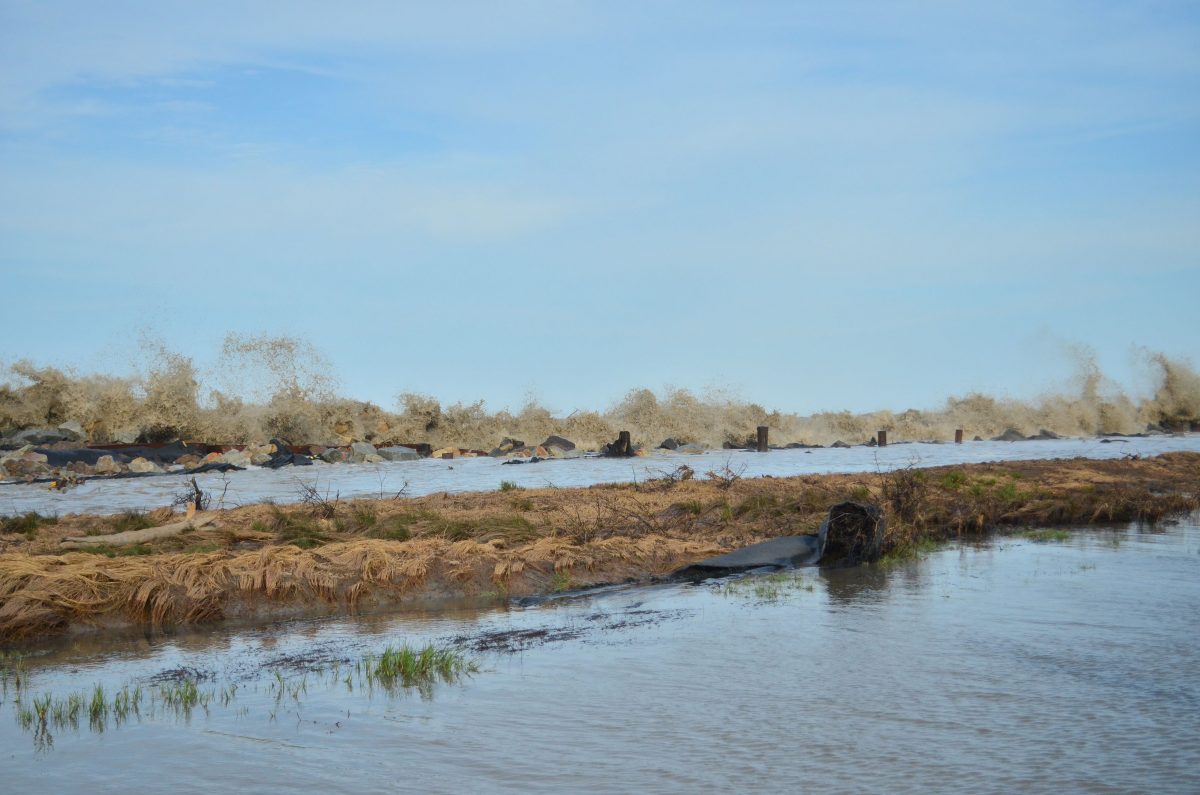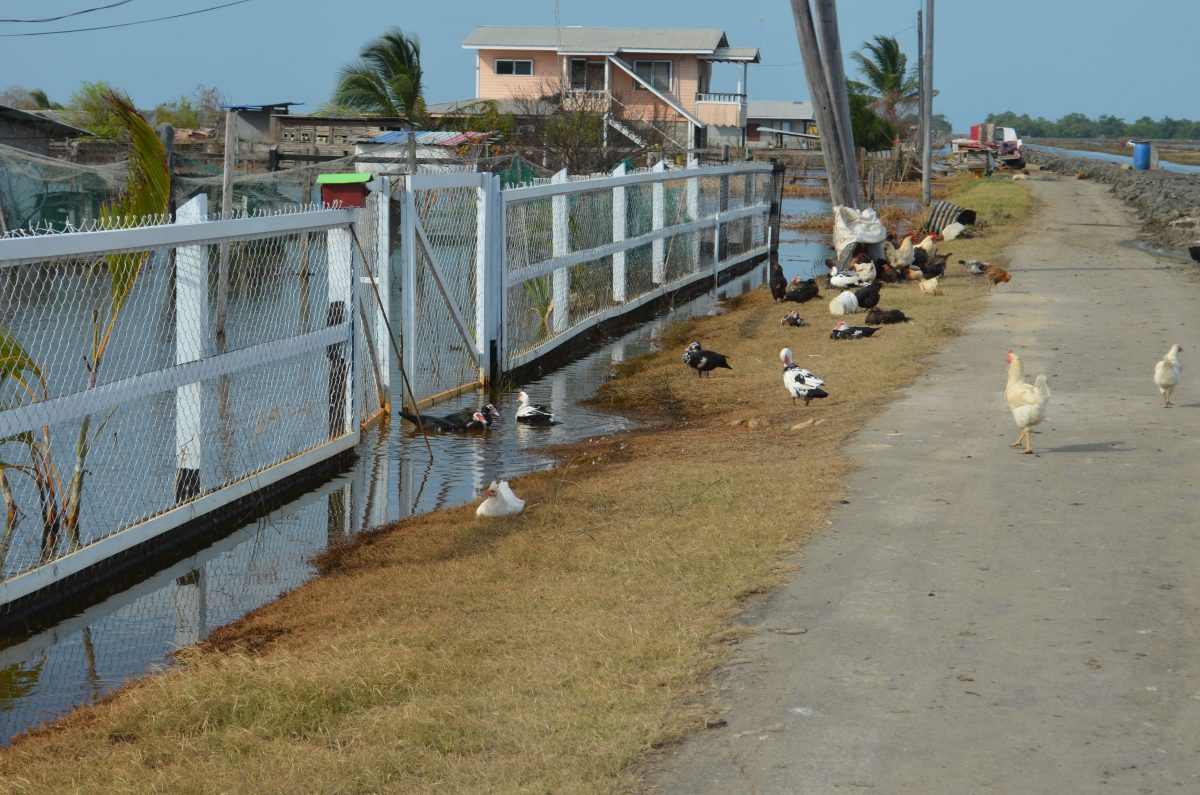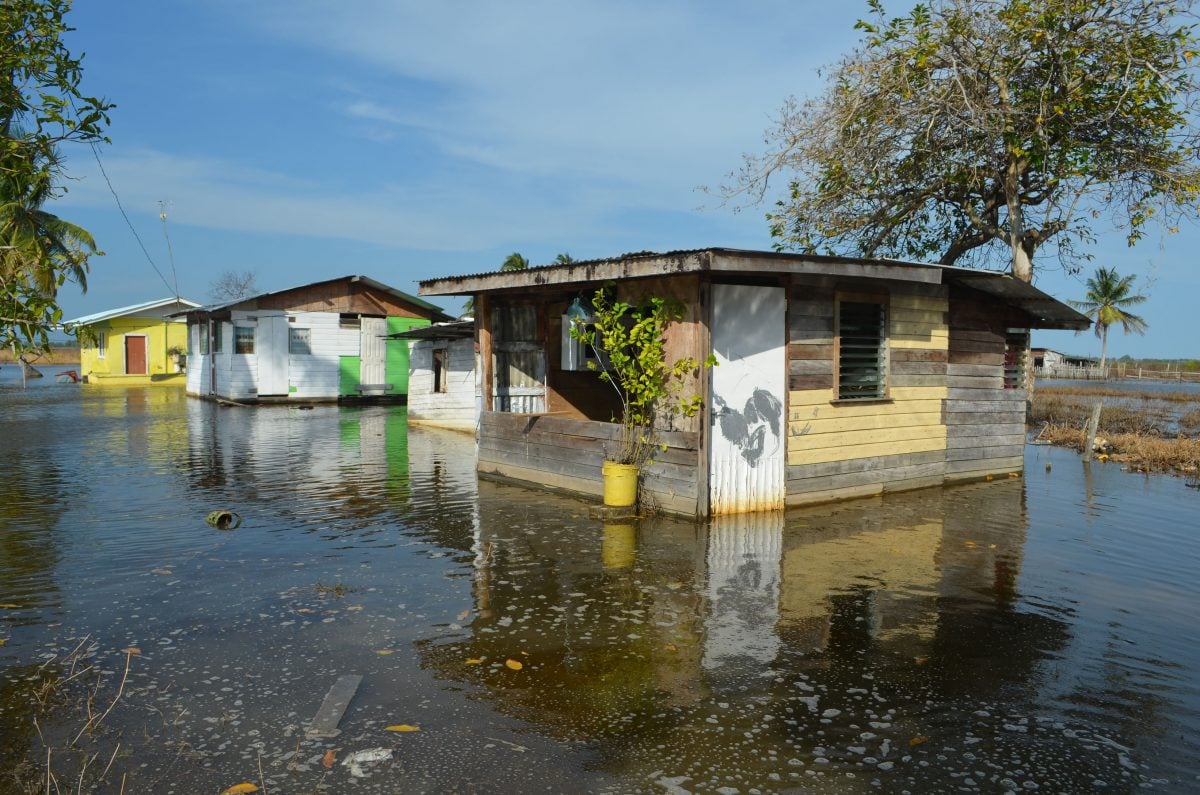Salt water from the recent spring tides has entered the rice lands in the Mahaicony Backlands and farmers are unsure of future cultivation since the land has become salted and will not be able to sustain growth.
This occurrence is one that the farmers have been dreading as their livelihoods are sustained through rice cultivation and livestock rearing. Currently, farmlands in the communities between Dantzig and Zealand are inundated by salt water.
Two separate springtides over the last month have had devastating effects on the lives of residents leaving them to cope with unexpected damage as well as being flooded.

The residents of Mahaicony became vulnerable as a result of the breaches in the sea defence along Dantzig to Fairfield. The three-kilometre stretch along the shoreline is currently being impacted by major erosion of the foreshore and depletion of the mangrove fringe.
“At Mahaicony, significant stretches of earthen embankment have been subjected to severe erosion and overtopping due to the exceptional natural erosion of the foreshore and the depletion of the system of mangrove. The critical condition of the shoreline has escalated due to the impacts of the current spring tide. Major breaches have occurred releasing salt water into the adjacent Bellamy Canal and agriculture lands…” the Ministry of Public Infrastructure had stated.

Farmers yesterday told Stabroek News that they are uncertain of their next move as they see no alternatives to providing for their livelihoods.
“We don’t know of any other alternatives. There is none, this is what we have been doing for generations – farming. The lands are salted now and that means we cannot plant anything for the next few years. Nothing will grow. If we mind livestock we won’t have grass to feed them and the rice won’t grow. This is our situation now,” a farmer told Stabroek News yesterday during a visit to affected
communities. Farmers yesterday said that they were disappointed at government’s laidback approach to fixing the breach along the shoreline. They insisted that fragile shoreline was identified almost a year ago and if the government had acted since, the situation that they are in today would have been nonexistent.

“This is not no overtopping that we are suffering from this is blatant negligence on government’s part. We told them about the sea dam but they didn’t do anything and now they are coming and say it is over-topping and all kinda things. Our entire livelihoods are disrupted. Everyone who lives in this area [Dantzig to Fairfield] are suffering losses,” Dodsley Nobrega, one of the many farmers who were affected told this publication.
A rice farmer, Maniram Doodnauth told Stabroek News that water levels in some areas are as high as six feet. He explained that with that level of water and the amount of time it has already stayed on the land, rice cultivation is unlikely for a long time. He also noted that because of poor drainage system[s] the water is likely to stay longer on the land.

“The water level is not dropping and we don’t have proper drainage to assist us. It seems as if they would have to create a koker system on the south side [back lands] to for us to have some relief or else the rice lands won’t drain,” he said.
Some parts of the lands where rice was planted are now covered by salt water. “Some farmers tried to reap their rice but some couldn’t because the ground is too soft and the whole stalk coming out. Only a few farmers get to reap a little bit,” he added.
Other farmers of Harmony Hall and Rebecca Lust told Stabroek News that because of the situation in the backlands, their losses range from $700,000 to $3.5 million.
Another rice farmer, Steve Reginald of Quaker Hall told this newspaper that he has suffered tremendous losses as he had cultivated a hundred acres of land. “It is plenty plenty losses which will be around $20 million when you factor in the money you spent and what you had expected to make,” Reginald said.
In his estimation, he said lands will be ready for cultivation within the next five years. “Unless there is plenty rain to wash the lands we won’t be able to use it. It is really a rough year for farmers here in Mahaicony because we haven’t expected this and now we have to think what we will do next,” he lamented.
Asked if renting lands is an alternative means for cultivation, he frowned and explained that it is a risk a farmer would have to take. “When you rent land if you get any losses it is high. You have to pay the landowner first before you can plant and if anything goes wrong after that you have to bear all the losses,” he related.
A farmer of Prospect told this newspaper that because she is unable to provide adequate grazing space and food for her livestock, she has made the decision to sell.
“The salt water did a lot of damages and we had to sell all the sheep and cows because they don’t have space to graze plus there is no grass for them to eat. We lost over 50 acres of rice too so it has been hard on us,” Khemwantia Jorree said.
She noted that she is now considering what would be her next move to provide for her family. “This is a real disaster for us, [for] every farmer it is a disaster but we have to find something else to do,” she said.
When the water levels rose on Monday, Jorree said that an entire pen of poultry was washed away.
“The water rose so quickly and we heard the fowl made some noise when we look they were gone, the water just rushed in on us,” she related.
Meanwhile, Nobrega, a cash crop farmer, told this newspaper that his losses are between $2 million to $3 million. He noted that the prices for crops on the market were satisfactory and he was in process of reaping when the floods came and washed the crops away.
“We don’t know if we will be able to plant back in a while because of this salt water on the land. All our trees and plants died, nothing was saved,” he said.
Farmers also voiced disappointment over the visits of ministers of government, who they said are only involved in making promises.
“We don’t want people to come and listen to what we have to say and make promises. We want them to come with solutions because we want to return back to a normal life. We want them to say that the sea defence will be fixed and how it will be fixed and get to work,” Manita Simpson, a watermelon farmer stressed.
Many yards within Harmony Hall and Rebecca Lust are presently waterlogged and surviving animals are currently on the streets.
Simpson’s yard is completely covered by water. She said that since the tides in September her yard has been covered by water and that the water level has risen within the last week.
“What is going on is unacceptable because people are suffering. We don’t need bleach and soap powder we need action and solution. We want to return to a normal life,” she said while calling on the Ministry of Public Health to step in and offer medical checkups to residents. She noted that since the flooding there has been an infestation of mosquitoes and flies in the communities.
She noted too that the floodwaters are contaminated due to many residents using outhouses.
“They need to come and visit people homes and see what is happening. They need to see what we are living in and stop taking to us on the road and making promises,” she said as she alluded to ministerial visits that has taken place.
A family who reside behind Simpson had to be relocated after water flowed into their homes.
Cleveland Ramsammy, a community leader, said that it is time that government considers and drafts an emergency plan to relocate residents from the coast.
“With what I have seen over the past days I think it will get worse and we need to move to higher grounds. Persons including myself are willing to move right now because of what is happening here. We are seeing the effects of climate change we are also suffering from it and it is time we look at options as [to] where we can live,” Ramsammy declared.
Meanwhile, works are continuing at the breached sea defence. During a Stabroek News visit to the area yesterday, trucks loaded with sand were arriving on site. Workers said they still have to simultaneously build an earth dam and lay boulders to create a rip rap. An extended stretch of the shoreline remains untouched. At that part of the shoreline, the sea level and the Bellamy Canal level are one, and as waves crash against the sea dam, it freely flows over into the canal.





